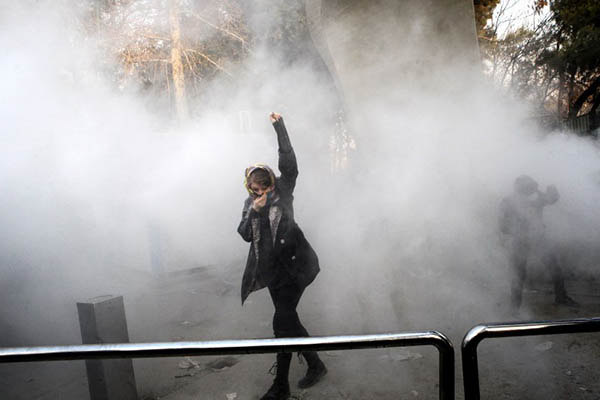
AFP
Tehran’s president has pledged to create more ‘space for criticism’ to head off further unrest
New protests were held in Iran overnight, local media said on Monday, despite President Hassan Rouhani calling for calm and vowing more “space for criticism” in a bid to head off days of unrest.
Rouhani finally broke his silence on Sunday night about the protests that mark the biggest test for the regime since mass demonstrations in 2009.
Police used tear gas and water cannon to disperse a small protest in Tehran’s Enghelab Square on Sunday evening, according to unverified social media videos. Protesters in the small northwestern town of Takestan torched a school for clergy and government buildings, the ILNA news agency said, while the state broadcaster said two people had died in Dorud after crashing a stolen fire engine. There were also reports of protests in the cities of Izeh (southwest), Kermanshah and Khorramabad (west), Shahinshahr (northwest) and Zanjan (north).
Verifying reports remained challenging due to travel restrictions and sporadic blocks on mobile Internet and popular social media sites including Telegram and Instagram.
The protests began as demonstrations against economic conditions in second city Mashhad on Thursday but quickly turned against the Islamic regime as a whole, with thousands marching in towns across Iran to chants of “Death to the dictator.”
“The people are absolutely free in expressing their criticisms and even protests,” Rouhani said in a message on the state broadcaster. “But criticism is different to violence and destroying public property.”
He sought a conciliatory tone, saying that government bodies “should provide space for legal criticism and protest” and calling for greater transparency and a more balanced media. U.S. President Donald Trump said the “big protests” showed people “were getting wise as to how their money and wealth is being stolen and squandered on terrorism.”
“Looks like they will not take it any longer,” he wrote on Twitter. In a later tweet, Trump accused Iran of “numerous violations of human rights,” and commented on the disruption to social media, saying it “has now closed down the Internet so that peaceful demonstrators cannot communicate. Not good!”
Rouhani dismissed Trump’s comments. “This man who today in America wants to sympathize with our people has forgotten that a few months ago he called the nation of Iran terrorist. This person whose whole being is against the nation of Iran has no right to feel pity for the people of Iran.”
After initial silence, state media began showing some footage on Sunday, focusing on young men attacking banks and vehicles, an attack on a town hall in Tehran, and images of a man burning the Iranian flag. Two hundred people were reported to have been arrested in Saturday night’s unrest in the capital.
“Those who damage public property, disrupt order and break the law must be responsible for their behavior and pay the price,” Interior Minister Abdolrahman Rahmani Fazli said on Sunday. “The spreading of violence, fear and terror will definitely be confronted,” he added.
There have been reminders of the continued support for the regime among conservative sections of society, with pro-regime students staging sizeable counterdemonstrations at the University of Tehran over the weekend.
Rouhani came to power in 2013 promising to mend the economy and ease social tensions, but anger over high living costs and a 12-percent unemployment rate have left many feeling that progress is too slow. Unemployment is particularly high among young people, who are generally considered less deferential to authority.
“Rouhani has run an austerity budget since 2013 with the idea that it’s a tough but necessary pill to swallow to manage inflation and currency problems and try to improve Iran’s attractiveness for investment,” said Esfandyar Batmanghelidj, founder of the Europe-Iran Forum. “But choosing years of austerity immediately after a very tough period of sanctions is bound to test people’s patience,” he said.
Police have so far taken a relatively soft approach to the unrest. They deny shooting two men killed in Dorud on Saturday night, although information has been hard to obtain amid the near-total media blackout. The authorities have blamed external forces for fomenting violence, saying the majority of social media reports were emanating from regional rival Saudi Arabia or exile groups based in Europe.
Since the ruthless repression of the 2009 protests against a disputed presidential election that gave hardliner Mahmoud Ahmadinejad a second term, many middle-class Iranians have abandoned hope of securing change from the streets. But low-level strikes and demonstrations have continued, with groups such as bus drivers, teachers and factory workers regularly protesting against unpaid wages and poor conditions.
